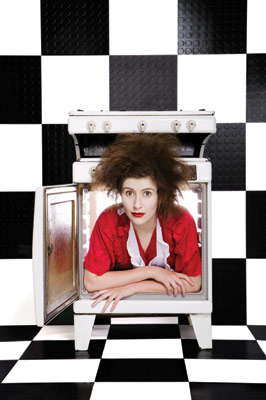Ever wonder what goes on in the mind of an artist? Asheville actress Elisabeth Gray and her director, Oxford classmate Anthony Wilks, sat down in the lobby of 35Below surrounded by Luke Hayne’s American Nostalgia quilt show to share a bit of insight while cooking up Gray’s next performance.

Xpress: Why Sylvia Plath? Gray:
My tutor at Oxford called me when I was living in L.A. She said, “Elisabeth, I want you to write a play about Sylvia Plath.” I said, “I can’t stand Sylvia Plath.” She said, “Oh, but Elisabeth darling you have so much in common with her.” That intrigued me. I read her journals and found her to be so funny, energetic and lovable that I said, “All right, I’ll write the play.”
I don’t think funny and energetic when I think Sylvia Plath. Wilks:
She was a very theatrical person in the performance of her life, and being a poet, there was a performance to that. She lived her own one-person show.
Is this a documentary of her life? Gray:
No, Sylvia Plath is never mentioned in the play. It’s the character Ester Greenwood from Plath’s novel, The Bell Jar, 10 years later sticking her head in the oven.
Wilks: It’s very satirical about the culture she lived in.
Gray: Plath killed herself in 1963, but she is a product of that 1950s housewife mentality. It’s the hallucinations that Ester has while her head is in the oven the last 10 seconds of her life.
Ten seconds explode into 80 minutes? Gray:
There’s a wonderful line from poet Elizabeth Bishop, “Life and the memory of it so compressed they’ve turned into each other.” Ester Greenwood is looking back on her life and reconstructing the way only a writer can. People say, “A comedy about suicide?” It sounds dreadful, or disrespectful. It’s neither, it’s about the triumph of the mind to take circumstances and turn them into whatever you want them to be.
Audiences often shy away from suicide. Gray:
It’s not about suicide. Every bit of entertainment I’ve seen related to Sylvia Plath makes it the pinnacle. What we’re doing is making a play about life and starting with the death. Start with what people know, work from there and broaden horizons when thinking about Plath and her work.
I was horrified reading The Bell Jar by how they tried to make her “normal.” Wilks:
Ted Hughes was horrified by it as well. Experimenting with what electricity would do is horrifying. The play deals with the history, not just of her mental illness, but how that was treated and developed.
Gray:
There’s a segment of electroshock therapy in the play. I don’t know that I agree that electroshock therapy contributes to mental illness. It does contribute to frying your brain. There’s a book called Touched with Fire: Manic-Depressive Illness and the Artistic Temperament by Kay Redfield Jamison. She goes through the past 200 years and looks at every poet and visual artist who would have been declared by a psychiatrist today to be manic-depressive, and questions what would have happened if these people were medicated to be normal. She doesn’t answer the question, and I don’t personally have a platform on the matter, but it is curious, this notion of kicking people into normalcy.
Do you feel this play is relevant today? Gray:
It’s entirely relevant. Plath put her head in the oven and killed herself when she had children. The struggle of juggling creativity and domesticity is no different today. I think men can relate to it as well, the struggle of balancing your inner life with your outer world of responsibility. Plath was desperate to be the perfect housewife. She typed all of Ted Hughes’ poems for him willingly, and yet no one was typing up her poems.
What do you hope the audience will take away? Gray:
I hope people leave the theatre having laughed, maybe cried, having expanded their capacity for compassion, and really feeling the triumph of human life.
Wilks:
Hopefully, it will make them reflect a bit on how they understand their own lives, which doesn’t necessarily have to take place when you have your head in the oven. I think everyone might see themselves as Ester Greenwood in her kitchen imagining that she’s creating something more in the preparation of the food, the ceremony and the joy of it.
Gray:
It’s through the show that she prepares the recipes of her life, Black Tar Brain Soufflé, 52 Liar Lasagna, and the perfect life. It’s about how you create. What’s the recipe for a perfect life? You spend all this time aiming for this perfect presentation, then it’s consumed, and then it’s over.
Wilks:
That’s why you have to enjoy the preparation.
Wish I Had a Sylvia Plath premiered at Bebe Theatre in 2007. After touring California and Europe, Gray has returned for a run at 35Below in July, before taking the play Off-Broadway in August. This collaborative effort includes a quilted kitchen created by Gray’s former Asheville High schoolmate, Luke Haynes, as well as multimedia pieces by Juilliard directing fellow John Farmanesh-Bocca.
Wendi Loomis can be reached at wendi@jazzandpoetry.com.
what: Wish I Had a Sylvia Plath



Is “Wish I Had a Sylvia Plath” written by Elisabeth Gray different from “Wish I Had a Sylvia Plath” written by Edward Anthony? Seems odd that two playwrights would come out with a play with the same title.
Elisabeth Gray wrote the play “Wish I Had a Sylvia Plath” under the pseudonym Edward Anthony.